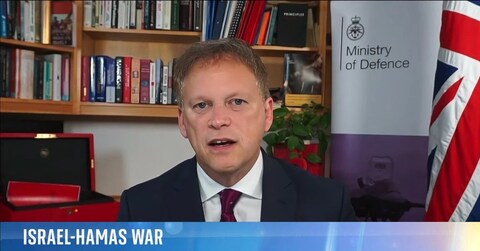Ofcom says BBC can decide to call Hamas terrorists after presenter …
Ofcom has confirmed that the BBC can decide whether or not to call Hamas "terrorists" after a presenter suggested the decision was down to rules set by the regulator. The broadcaster has faced heavy criticism over the last five days for failing to describe the proscribed terror group as terrorists in its coverage of the Israel attacks. In an interview on BBC Radio 4's Today programme, presenter Mishal Husain appeared to shift responsibility to Ofcom when Grant Shapps, the Defence Secretary, challenged her on the issue.
However, the regulator has told The Telegraph that it is "for the broadcasters to decide the vocabulary they use to describe unfolding events". Speaking on Today this morning, Mr Shapps referred to "a very unfortunate article" which detailed why Parliament had legislated Hamas as a proscribed organisation and that the BBC thought it was "not appropriate" to call them terrorists.
 Grant Shapps, the Defence Secretary, believes the BBC should refer to Hamas as terrorists
Grant Shapps, the Defence Secretary, believes the BBC should refer to Hamas as terrorists
Hitting back, Ms Husain asked Mr Shapps if he was aware of the Ofcom code and rule for all broadcasters, before adding: "So you'll know the Ofcom broadcasting code requires that news in whatever form is reported with due accuracy and presented with due impartiality. Broadcasters are not the same as newspapers and indeed all UK broadcasters stick to the same language around terrorism and these groups.
That at the BBC we are not unique in this." Mr Shapps then said it was "pretty clear" that Hamas were carrying out "terrorist activities", before adding: "It would be helpful if the national broadcaster stuck by what Parliament has legislated and called a spade a spade." Ms Husain then responded by accusing Mr Shapps of "singling out the BBC" and asking if he was "calling for a change in the Ofcom broadcasting code".
And last night seven former culture secretaries wrote to Tim Davie, the broadcaster's director general, warning him that the corporation's refusal to brand Hamas as "terrorists" risked blurring its impartiality.
Letter urging BBC to reassess
The letter, led by Sajid David, urged the BBC to "urgently reassess" its approach to describing Hamas as "militants" and "fighters". News of the letter broke hours after one Jewish sports reporter - who had worked as a freelance commentator on BBC Radio - vowed to no longer work for the broadcaster, due to its stance on the issue. A British son of a 75-year-old woman taken hostage by Hamas on Saturday, also raised the issue in an emotional press conference in London.
He urged the UK media to call Hamas terrorists, saying "call the Hamas for what they are, a terror group, they need to take care of the civilians and instead they are taking others". Mr Sagi, 53, a psychotherapist, added: "They are using you [the media] to manipulate opinions and in this psychological warfare you are being used." When asked by a BBC reporter what he thought about the Israeli Government saying it would cut off power, water and fuel to Gaza until hostages were freed, and whether he felt it could harm his parents, Mr Sagi's response suggested he was unhappy with its current coverage.
Addressing the journalist, who had visited his home, he said: "You saw the pictures you've been in my house and you work for the BBC and I ask the BBC to call it for what it is. To use human code and to call it for what it is.
BBC statement
On Wednesday, the BBC published a statement online confirming it had received complaints about the issue. It said its coverage of the "unprecedented assault on Israel by Hamas" had "made clear the nature of the atrocities committed".
The statement also referred to its own guidelines which read: "Our reporting of possible acts of terror should be timely and responsible, bearing in mind our requirement for due accuracy and impartiality. "Terrorism is a difficult and emotive subject with significant political overtones and care is required in the use of language that carries value judgements. We should not use the term 'terrorist' without attribution."
An Ofcom spokesman said: "The responsibility for journalistic editorial guidelines rests with each broadcaster.
Provided they meet Ofcom rules on due accuracy in news, and due impartiality in news and current affairs, it is for broadcasters to decide the vocabulary they use to describe unfolding events."